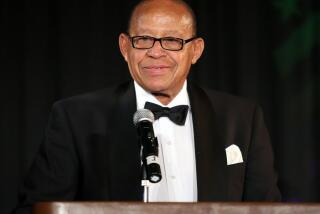Robert Richardson; Part of Team Reporting on Watts Riots
- Share via
Robert Richardson, a Los Angeles Times classified advertising messenger who volunteered his services to the news department during the 1965 Watts riots and became the newspaper’s only black employee reporting on the rioting, died Friday at 59, family members said.
He died in a West Los Angeles hospital of an asthma attack, his wife, Alice, said Sunday.
Richardson’s accounts, phoned in from the riot scene to Times rewrite men, contributed to the Pulitzer Prize won by the newspaper for coverage of the disturbance.
As a 24-year-old with a penchant for listening to the police frequency on a transistor set he always carried with him, Richardson heard about the rioting, drove to the scene and began phoning in descriptions of what was happening. Apparently, he was the one who first conveyed the soon-to-be-famous phrase that participants were yelling, “Burn, baby, burn.”
Richardson later told friends he had protected himself from rioters by leaning out of phone booths and screaming the same slogan.
Thirty-five people died in the rioting, which raged in South-Central Los Angeles for six days that August, before being controlled by National Guard troops and Los Angeles police.
Bill Thomas, a retired Times editor who was city editor at the time, recalled Sunday that Richardson, while “totally unschooled,” was “helpful during the riots and wrote some perceptive pieces.”
He was named a reporter trainee after the disturbances.
But Richardson was dismissed the next year, the same month the Pulitzer was awarded, in connection with a misdemeanor charge that was later dropped.
He had a subsequent journalistic career with several Los Angeles radio and television stations, although his wife recalled Sunday that he suffered from alcoholism and for a time lived on skid row.
Eight years ago, she said, Richardson gave up drinking and shared his experiences with Alcoholics Anonymous and Salvation Army gatherings in Los Angeles and elsewhere.
“His work for The Times during the Watts riot was the pivotal point in his life,” she said. “He was at the right place at the right time, and he was the right color. But mainly, he had the talent to write and observe.”
“Heat Wave,” a 1990 movie on the TNT cable network, was based on Richardson’s life. The title referred to the heat wave that gripped Los Angeles at the time of the riots.
The late Art Berman, who was among the rewrite men handling Richardson’s reports in 1965, had stayed in touch with him and introduced him to producers of the movie, who paid Richardson a fee exceeding $50,000 for his assistance.
Bought Car With Movie Check
Alice Richardson recalled Sunday that, riding home on the bus with an initial $12,000 check from the movie makers, Richardson saw a used car lot and said to himself, “What am I doing riding the bus when I could be driving?”
He got off the bus, bought a car and drove it home, she said.
“The movie was fairly factual, but there were some variances,” she recalled. “There weren’t as many kids as the six in his family, and the actor James Earl Jones played a role as his mentor, which was not accurate.”
Members of the family went to the premiere and greatly enjoyed it, she said.
Born in Birmingham, Ala., Richardson came with his family to Los Angeles as a small child and attended Fremont High School, where he played football.
But he dropped out of high school in the 11th grade and joined the Army.
Richardson went to work for The Times about a year before the riots, and, according to his sister, Yvonne Wynn, always had the ambition to become a reporter.
His wife said Richardson was “a grateful person” for having had the opportunity to report for The Times and had told her, “I don’t blame anyone for losing my job. If I’d not been drinking, I might have asked for the training I needed.”
Until the end of his life, she said, he listened to police communications on the radio.
Richardson is survived by his wife, a son, Robert, of Moreno Valley, his mother, Marie Richardson, three sisters and two brothers.
Services will be at 3:30 p.m. Saturday at the Santa Monica facility of the Salvation Army, 1533 4th St. The family asks that any contributions be made to a Salvation Army memorial fund at that address.
More to Read
Sign up for Essential California
The most important California stories and recommendations in your inbox every morning.
You may occasionally receive promotional content from the Los Angeles Times.










